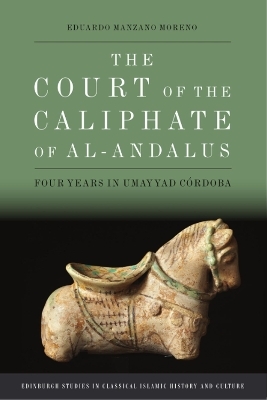
The Court of the Caliphate of Al-Andalus
Edinburgh University Press (Verlag)
978-1-3995-1612-9 (ISBN)
Provides a comprehensive study of the caliphate of Cordoba based on the 'annals' by '?s b. A?mad al-R?z? and other Arab sources relating to the period
Brings together textual evidence with the archaeological record to produce a vivid description of the social formation of al-Andalus in this period
Analyses the structure and operation of a centralised 'state' in the High Middle Ages
Examines the legitimisation of power and authority in an Islamicate social formation
Offers a rigorous study of the Caliphate of Cordoba, which is usually the subject of idealised views with little historical base
Makes accessible to English-speaking audiences the huge advance of recent historical studies on the Umayyad caliphate
During the second half of the 10th/4th century, the Umayyad caliphate of al-Andalus became a powerful political formation in Western Europe. Described by the contemporary German nun Hrotsvitha as the 'ornament of the world', Cordoba was the destiny of embassies and traders coming from places as far away as Constantinople, the Ottoman empire and Italy. The zenith of this political supremacy coincided with the rule of al-?akam II (961-976 CE), whose name is associated with the enlargement of the mosque of Cordoba, the magnificent palatine city of Mad?nat al-Zahr?? and the rich caliphal library which housed Arab, Latin and Hebrew manuscripts.
This book is based on an extraordinary source that had never been the subject of a comprehensive study: the annals written by an official and chronicler of the caliph's court, '?s b. A?mad al-R?z?, who carefully annotated the big and small events of the court. Used by Ibn ?ayy?n to compose one of the volumes of his celebrated Muqtabis, these 'annals' have come to us in a substantial fragment of more than 135 folia that cover the period from June 971 to July 975 CE. This source provides an eye-witness account of the caliphate, which describes with stunning detail all the events, characters, places and narratives of the Umayyad caliphate, and is a fundamental work in helping us to understand the configuration of the Mediterranean in the 10th century CE.
Eduardo Manzano Moreno is Research Professor at the Consejo Superior de Investigaciones Cient ficas in Madrid and British Academy Global Professor at the University of St. Andrews. Between 2007 and 2012 he was Director of the Centre for Social and Human Sciences of the CSIC He has been visiting professor at the universities of Oxford (St. John's College), Chicago (Tinker Professor) and the School of Oriental and African Studies. His research has focused on the history of al-Andalus and on the political implications of historical memory. He has directed numerous research projects focusing on both subjects, on which he has also published a large number of articles and book chapters in English, French and German publications. Previous works include Conquistadores, emires y califas. Los omeyas y la formaci n de al-Andalus (Editorial Cr tica) and pocas Medievales (Editorial Cr tica).
| Erscheinungsdatum | 02.05.2023 |
|---|---|
| Reihe/Serie | Edinburgh Studies in Classical Islamic History and Culture |
| Übersetzer | Jeremy Roe |
| Zusatzinfo | 20 colour illustrations 20 colour image, 6 colour maps, 1 table |
| Verlagsort | Edinburgh |
| Sprache | englisch |
| Maße | 156 x 234 mm |
| Themenwelt | Geisteswissenschaften ► Geschichte ► Regional- / Ländergeschichte |
| Geschichte ► Teilgebiete der Geschichte ► Religionsgeschichte | |
| Geisteswissenschaften ► Religion / Theologie ► Islam | |
| ISBN-10 | 1-3995-1612-4 / 1399516124 |
| ISBN-13 | 978-1-3995-1612-9 / 9781399516129 |
| Zustand | Neuware |
| Informationen gemäß Produktsicherheitsverordnung (GPSR) | |
| Haben Sie eine Frage zum Produkt? |
aus dem Bereich


